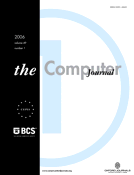-
Views
-
Cite
Cite
Lech Polkowski, Una-May O'Reilly, Tina Yu, Rick Riolo and Bill Worzel (Eds) Genetic Programming Theory and Practice II. Springer Science+Business Media, Inc. (2005). ISBN 0-387-23253-2. $129.00. 320 pp. Hardbound., The Computer Journal, Volume 49, Issue 1, January 2006, Pages 127–128, https://doi.org/10.1093/comjnl/bxh127
Close - Share Icon Share
Extract
The book offers edited papers presented at the Second Workshop on Genetic Programming, Theory and Practice held at the Center for the Study of Complex Systems at the University of Michigan in Ann Arbor during May 13–15, 2004. The aim of the organizers was to facilitate the exchange of ideas between researchers interested in methodological as well as theoretical reflection on Genetic Programming and those aiming at practical applications of this paradigm in diverse fields.
The collection of papers in the book is a witness to the fact that this aim was successfully achieved: papers are split into applications and theory almost evenly—10:7, and moreover, almost every paper contains a substantial discussion of both aspects, so the classification into applications and theory is by no means certain.
Genetic Programming is an offspring of Genetic Algorithms, a paradigm proposed by John Holland, that exploits evolutionary algorithms and represents solutions to problems as complex structures, usually trees. Potential solutions, called chromosomes, undergo evaluation according to specified rules and survive in the process owing to favorable values of the fitness function, being subjected to evolution by adequately defined processes of crossover, mutation etc.




